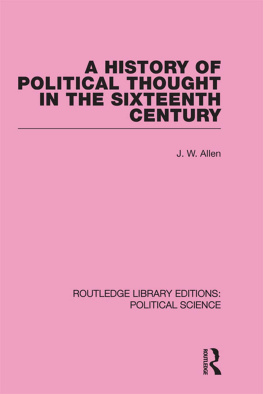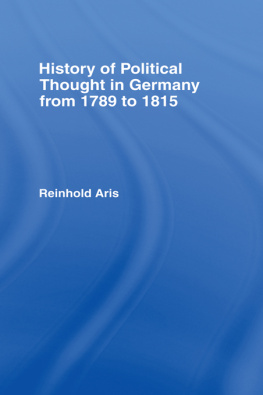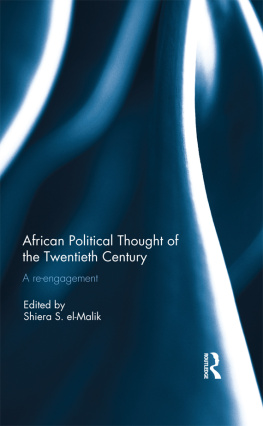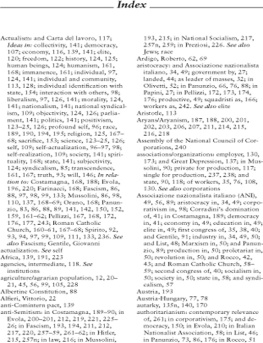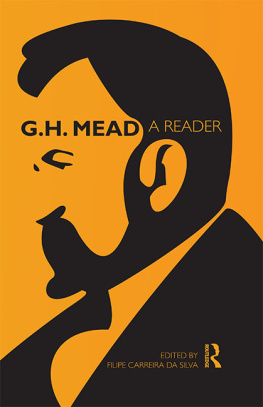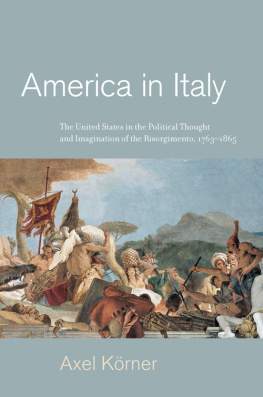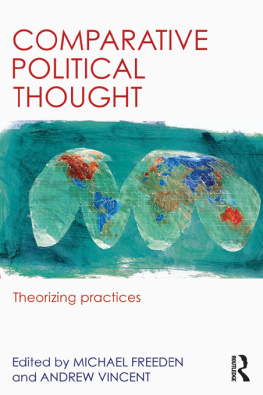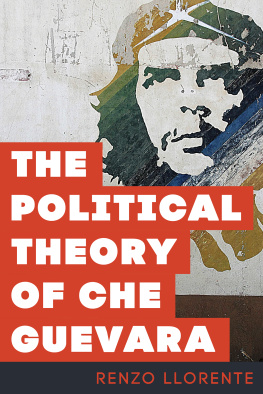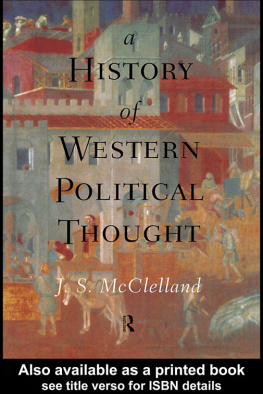ROUTLEDGE LIBRARY EDITIONS:
POLITICAL SCIENCE
A HISTORY OF POLITICAL
THOUGHT IN THE
SIXTEENTH CENTURY
A HISTORY OF POLITICAL
THOUGHT IN THE
SIXTEENTH CENTURY
By
J. W. ALLEN
Volume 16
First published 1928
This edition first published in 2010
by Routledge
2 Park Square, Milton Park, Abingdon, Oxon, OX14 4RN
Simultaneously published in the USA and Canada
by Routledge
270 Madison Avenue, New York, NY 10016
Routledge is an imprint of the Taylor & Francis Group, an informa business
1928 J. W. Allen
All rights reserved. No part of this book may be reprinted or
reproduced or utilised in any form or by any electronic, mechanical,
or other means, now known or hereafter invented, including
photocopying and recording, or in any information storage or
retrieval system, without permission in writing from the
publishers.
British Library Cataloguing in Publication Data
A catalogue record for this book is available from the British Library
ISBN 10: 0-415-49111-8 (Set)
ISBN 13: 978-0-415-49111-2 (Set)
ISBN 10: 0-415-55551-5 (Volume 16)
ISBN 13: 978-0-415-55551-7 (Volume 16)
Publisher's Note
The publisher has gone to great lengths to ensure the quality of
this reprint but points out that some imperfections in the original copies may be apparent.
Disclaimer
The publisher has made every effort to trace copyright holders and
would welcome correspondence from those they have been unable
to trace.
A History of Political Thought
in the Sixteenth Century
by
J. W. ALLEN, M.A.
Late Professor of History at Bedford College
University of London
First published by Methuen & Co Ltd
20 September 1928, and reprinted three times
Reprinted, with revised bibliographical notes, 1957
First published in this series in 1960
Reprinted 1961 and 1964
Printed in Great Britain by
Butler & Tanner Ltd, Frome and London
Catalogue No. 2/6754/27
1.3
University Paperbacks are published
by METHUEN & CO LTD
11 New Fetter Lane, London EC4
and BARNES & NOBLE INC
105 Fifth Avenue, New York 3
TO
DULCIE L. SMITH
PREFACE
I have no use for a preface save to return thanks which are due, even though the expression of my gratitude can only be inadequate. But for the untiring assistance of Miss D. L. Smith this book would never, I think, have been completed and perhaps would never have been begun. At the critical moment she took on herself much tiresome work for which I had neither leisure nor inclination. Only less valuable has been the help given me by my old pupil Miss Hilda Clapperton. To these two I owe a great debt. Other friends also have helped me with advice, with encouragement and in other ways: they will know that I am not ungrateful. Was there ever, I wonder, a book which was wholly and solely the work of one man or woman ?
July 1928
J. W. ALLEN
PUBLISHER'S NOTE
The text of this book has been reprinted without alteration. The Bibliographical Notes, pages 517523, have been revised and brought up to date by Mr. J. W. Gough of Oriel College, Oxford.
INTRODUCTION
T HE sixteenth century was a period of relatively rapid and of formally revolutionary change. It may be compared in that respect with two other great periods of European history and with them only: the twelfth century and the nineteenth. It is mere truism to say that the great changes that took place were results of a long process. As in other such cases, their suddenness and their revolutionary quality were in part illusory. Essential psychological change preceded the formal revolution.
So long ago as the commencement of the fourteenth century it had been pointed out that the Empire of Christendom was a useless fiction. It had been declared that the Church and the Papacy constituted the main obstacle to the development of efficient secular government. It had been asserted that the clergy as such had no right to speak in the name of the Church. On these texts the thinkers of the fourteenth century had enlarged considerably. All through the fourteenth and fifteenth centuries, the clergy and the Pope had been suffering loss of prestige and of moral authority. The actual constitution of the Church Catholic was increasingly undermined by heresy, by scepticism and by covetous jealousy of its property and its jurisdictions. It was increasingly menaced by the growth of nationalist sentiment and organization, at least in France and in England. A crash became inevitable, and in the sixteenth century the Church was torn to pieces. What we call the Reformation was, in one aspect, the definitive triumph of secular authority in a struggle with the Church already centuries old. In one country after another, the secular government established its local control of the Church, absorbing in the process much, at least, of its property and jurisdiction. In city after city, from Stralsund to Geneva, the Reformation appears as the last act of an age-long conflict between city and Bishop. Even in Catholic countries the same thing happened in some degree. When Francis I secured from the Pope in 1516 the right to appoint his own bishops and by the ordinance of Villers Coterts in 1537, curtailed ecclesiastical jurisdiction, he was doing, so far as he could, what Henry VIII did in England. Ferdinand of Austria, like the Protestant Princes of North Germany, dissolved monasteries and appropriated the property. In Spain the Inquisition set up by the King in defiance of the Pope, was, among other things, a royal instrument for the control of the clergy. The Reformation was part of the process by which Europe was resolved into a series of independent, secular, sovereign States.
Along with the efforts of Princes and Magistrates to master and to dispossess the Church, went, part cause and part consequence, a great religious revival. It is, perhaps, a little unfortunate that the term Reformation has come to be so completely associated with Protestantism, that the Catholic revival is spoken of as Counter-Reformation. The religious revival of the century was Catholic as well as, and no less than, Protestant. A great effort was made by the Catholic Church to reform its discipline and administration and to define its doctrinal position. The intensity of the religiousness developed in Spain was at the least as great as appears in any Protestant country. Everywhere to the struggle over property and jurisdiction were added efforts to establish or maintain or propagate true religion. Governments, however reluctantly, were compelled to take share and side in them. Confusion was confounded by the development of the Calvinistic ideal of a Church-State; a development peculiarly embarrassing to Protestant governments.
Enormous in extent and intensity was the resulting friction. The Reformation involved huge transferences of property and jurisdiction. It involved war, and, above all, civil war. It necessitated efforts on the part of governments to organize their conquests and to make of the reformed church an instrument of their purposes. It involved what is called religious persecution. And it involved, of course, a vast and many-sided literary controversy.

